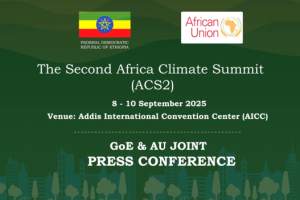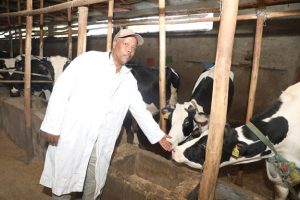
The Afar Regional State is known for its unique geological features and significant mineral resources. The region is characterized by its arid desert landscapes, active volcanic activity, and the presence of the Danakil Depression, one of the hottest and lowest places on Earth. This geological diversity has resulted in the presence of various types of minerals and valuable resources, attracting attention from both domestic and international mining companies.
One of the notable minerals found in the Afar region is potash. The Danakil Depression is home to vast salty flats and large deposits of potassium salts, making it an ideal location for potash extraction.
According to the mining review of Africa research, the Afar state holds significant reserves of potash, estimated to be one of the largest in the world. Several companies have invested in potash mining projects in the area, aiming to utilize these resources for agricultural purposes and international export.
In addition to potash, the region is also rich in other minerals such as copper, gold, and tantalum. These minerals have attracted the interest of mining companies seeking to exploit the region’s potential. Exploratory activities and small-scale mining operations have taken place in various parts of the Afar region, with the goal of assessing the commercial viability of these mineral deposits.
Ibrahim Dihilu, Deputy Head of Afar Region Mining and Enterprise Development Office, told to the Ethiopian Press Agency that studies are currently taking place in particular districts in the area to determine the approximate location of the other minerals in the area in addition to the amount of gold, salt, copper, manganese, and construction materials that are mined there. Among these, the kola Ber district is the one where gold is found, he noted.
He stated that there are preparations to carry out research with the assistance of the University of Samara in all zones, reorganize the associations, extract and produce gold in large quantities and perform operations that will benefit society in the gold industry in the current year.
In the past year, the Afar state planned to generate a revenue of some 35 million birr in the sector of mineral resources, actually obtaining 41 million and expects to raise this figure to 50 million birr in the current fiscal year. And he also stated that the region’s income from the sector is below what it should be, and as a result, black market, traditional gold mining is practiced in the region.
He said that despite the fact that there are 13 associations with more than 1,200 members organized in the region’s gold industry, only five of them are effective and producing a positive effect on the sector.
Additionally, high temperatures, a severe lack of water supplies, and an extremely arid climate are all characteristics of the Afar state. These circumstances present difficulties for mining operations due to the fact they have the potential to have an impact on worker security, equipment performance, and the availability of water for various mining processes.
And also, the region is geographically remote and often difficult to access due to its rugged terrain and lack of developed infrastructure. The absence of proper transportation networks makes it challenging to transport heavy equipment, supplies, and extracted minerals to and from mining sites, increasing logistical costs and operational complexities.
Furthermore, the Afar region is home to fragile ecosystems and unique biodiversity. Mining activities have the potential to cause environmental degradation, including habitat destruction, soil erosion, and pollution of water sources. Ensuring environmental protection and devotion to sustainable mining practices can be challenging and require careful monitoring and mitigation measures.
The absence of developed infrastructure, such as roads, water supply, and electricity infrastructure, as well as the restricted local labor force and abilities, hinder mining operations in the region and indicate the state’s security at danger. These aspects contribute to the region’s mining activities’ high costs and difficulty.
In this sense, he said that the region has planned to set up four more associations this year in order to create 250 opportunities for residents by assisting citizens in organizing and creating a comfortable working environment in teams, offering trainings to improve capacity, and providing the tools and support needed for the task.
To prevent the black market in the region based on the amount and quantity of gold production that each association in the region submits to the National Bank is compared to determine an incentive award is used. And he also mentioned that two associations received gold melting and searching equipment during the 2015 E.C. fiscal year as a result.
Despite the fact that the gold produced is used for illegal trade due to a lack of infrastructure, a bank has been established in the region where the production is widespread to address the issue. He emphasized that, we are actively collaborating with the National Bank to reopen banks that were closed due to peace and security issues so as to facilitate the mines trade. Additionally, he added that the National Bank is trying to solve the issue by persuading the producers to deposit money directly into the bank by offering them various supports.
Furthermore, the state government maintains strong controls over every custom to prevent the black market, and it has been given strict directives to stop the movement of gold or any other form of mineral by individuals who are unlicensed, he added.
He stated that the region is well known for producing 85 percent of the salt, and it is used to supply the Ethiopian market, which promoted the need for a larger market connection. He further stated that the fact that a region has a lot of natural resources doesn’t necessarily mean that it will prosper. Investors and young people interested in the industry may come together in any mining sector, and the office will give them the support they need to do so.
The Ethiopian government recognizes the potential economic benefits of mining in the Afar region and has taken steps to promote responsible and sustainable mining practices. The Ministry of Mines oversees the sector and has implemented regulations and licensing procedures to ensure that mining activities are conducted in an environmentally friendly and socially responsible manner. Additionally, the government attempts to attract foreign investment and promote partnerships with experienced mining companies to maximize the region’s mineral potential while minimizing negative impacts on local communities and the environment.
And also, addressing these challenges requires collaboration between the government, mining companies, local communities, and other stakeholders. Implementing supportive policies, investing in infrastructure development, promoting skills training and employment opportunities for local communities, and ensuring environmental sustainability are crucial steps toward unlocking the mining potential of the Afar Regional State.
Besides, the region has the potential to contribute to the economic development of the nation, but it also face challenges related to the region’s climate, infrastructure, and remote location. With proper planning, regulation, and sustainable practices, can be carried out responsibly, benefiting both the local economy and the country as a whole.
BY FIKADU BELAY
THE ETHIOPIAN HERALD SUNDAY EDITION 15 OCTOBER 2023




